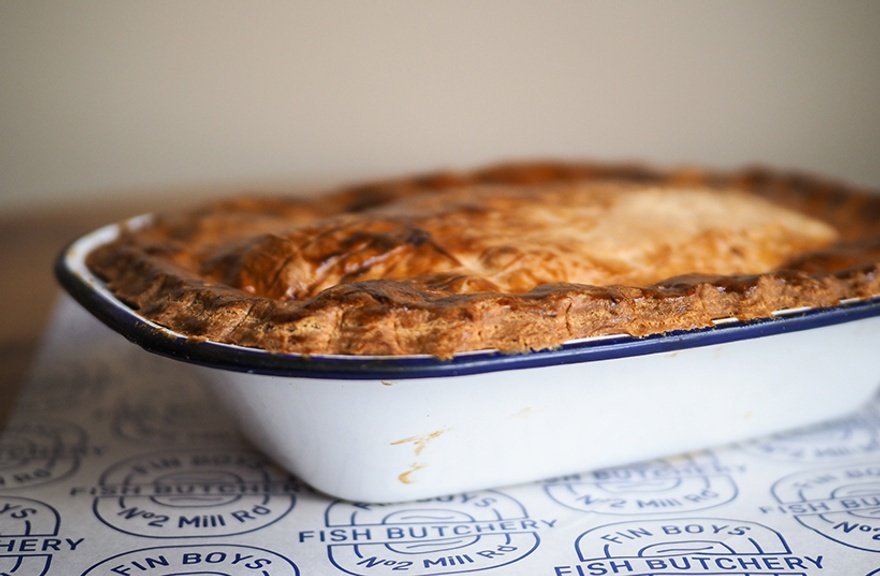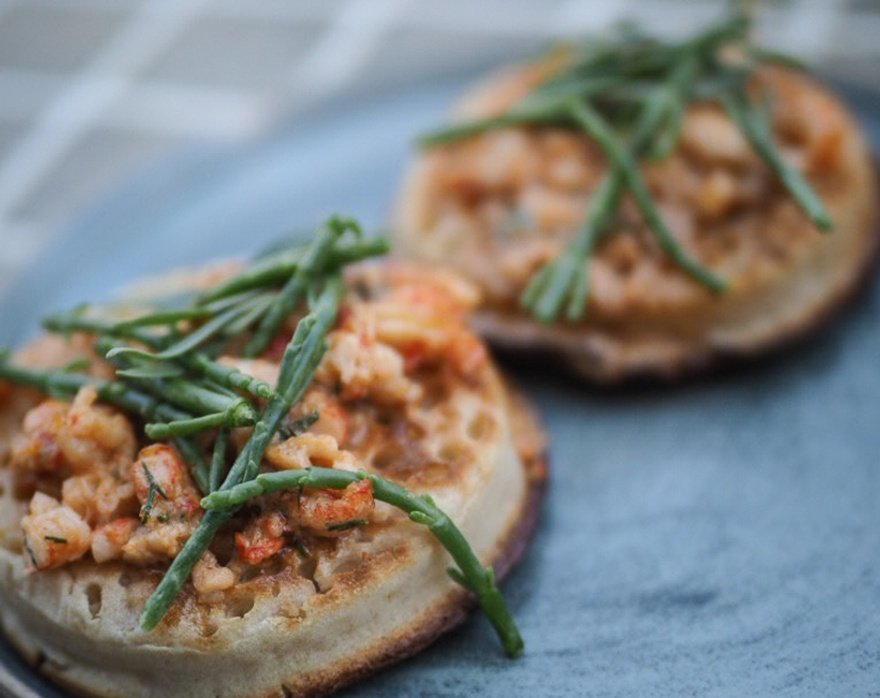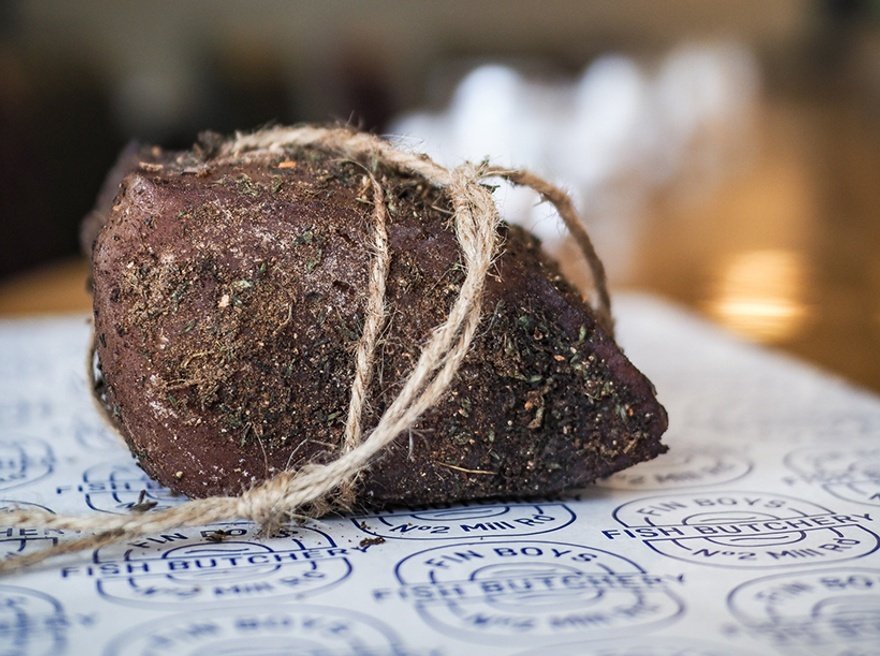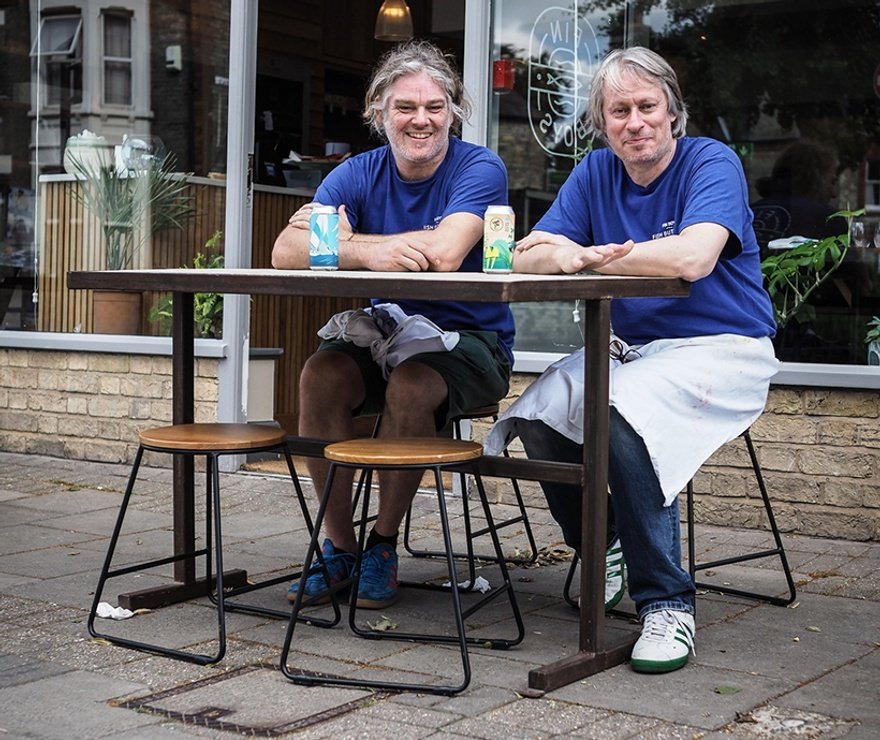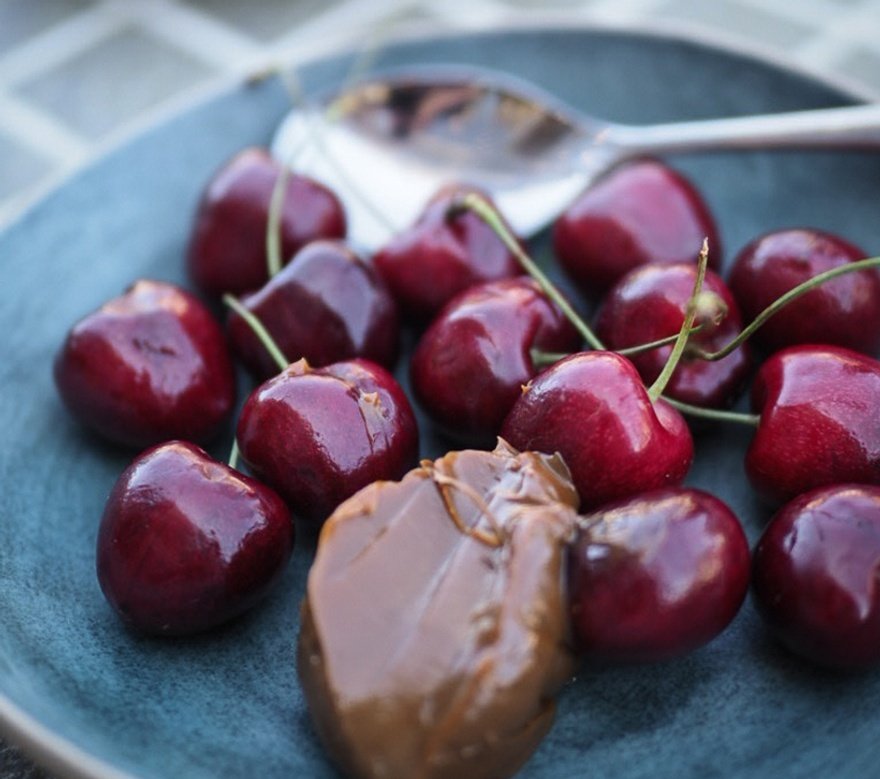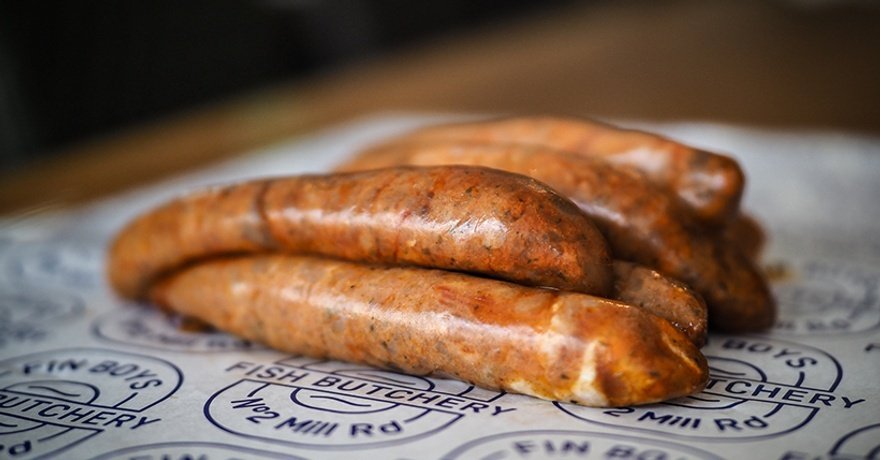Whole-fish butchery that includes bones, scales and skin turns offcuts into rich and varied creations celebrating the flavours of the sea in middle England. Tessa Allingham reports.
Australian chef Josh Niland may have set the fin-to-gill ball rolling, but two Cambridge chefs are putting their own spin on it at restaurant-fishmonger-deli Fin Boys.
Dry-aging techniques, whole-fish butchery, minimal waste and the use of lesser-known fish species mark the identity of this Mill Road spot, founded by friends and former kitchen colleagues Richard Stokes and Jay Scrimshaw. Following a complete refurbishment of a site that had stood empty for two years, Fin Boys opened in May for retail sales of fresh and dry-aged fish and shellfish, deli items and the likes of poké bowls (£8), heat-at-home curries (£30 for two), deli boxes (£30), with delivery via Click It Local.
Most customers gravitate to the 16-seat counter in the light-filled indoor space for the likes of seafood platters (£60), oysters (£12 for six), day-boat hake with romesco-stuffed piquillo peppers (£17) and salads (£7).
The July launch of evening service with a 10-dish fish menu – Scrimshaw resists the term ‘tasting menu' – completes the Fin Boys story. Guests, many from the neighbourhood, prepay £65 for the quick-paced sequence of small plates, and most leave having spent around £88. There has been little resistance to prepayment, and it helps cashflow, Stokes says.
The menu changes depending on day-boat deliveries but will always start with Porthilly oysters with the house ‘fin vin' dressing of garlic, soy, ginger and sesame, or a dash of nettle-jalapeño sauce from local small-batch producer Orriss & Sons. A bonito-infused set cream, its richness cut with roe cured in ponzu and presented delicately in an eggshell, might follow.
Pale-pink kingfish, more commonly found in Pacific waters but now farmed in Kent, is lightly cured and comes with a palate-pricking horseradish sauce and sweet beets. "If kingfish is overcooked it tastes like cotton wool," says Stokes. "It's best raw or very lightly seared.
Galician tuna is the only other farmed fish used. After being aged for four to 15 days, the fish is seared and glazed with nitsume (£12). The Japanese barbecue sauce is made by cooking down dry-aged turbot or bass bones, or smoked eel head and skin, with brown sugar, dashi, mirin, kombu and soy sauce. "We brush it over the fish, season with furikake and serve it with labneh," says Stokes. "The Japanese wouldn't add labneh, but it adds richness, balances the flavours." Sliced radish adds crunch.
The dry-aging cabinet holds fish at varying stages of butchery. It runs at 1.5-1.7°C, the humidity depending on the species. "The process takes the moisture out, just as it does with beef," says Stokes. "Moisture is the enemy of protein. That's why our fish never touches ice. Removing it leaves you with the natural oils and intensified umami flavour. The skin cooks up really crisp too, like pork crackling." A 4-5kg turbot may be aged for three days, bass up to 10. "The flavour is better, the texture buttery."
The chefs are keen to explore the boundaries of fin-to-gill eating. Trout skin has been used in a sweet granola, and they're experimenting with using scales in a similar way. Monkfish and red mullet livers have been used in terrines, or frozen and grated over dishes for flavour. Fish eyeball crackers "work really nicely". A Sunday brunch menu includes swordfish bacon and fish sausages. "We make a bacon cure with smoked salts, some nitrates and flavourings. It's dry-aged for three to four weeks."
Sorbet from Cambridge-based Jack's Gelato is a palate cleanser – yuzu and beetroot perhaps, or jasmine rice water – before dessert of rendered fish fat enriches a quenelle of dulce de leche served with a bitter chocolate crémeux, and shortbread crumb, salt and confit orange peel.
A 25-strong white-leaning list created with Liberty Wines and Cambridge Wine Merchants is priced with cash mark-ups, rather than percentage. "Our £40 wines would be £70-£100 in most restaurants," says Stokes. "It encourages people to choose better quality."
Stokes was chef-patron at the Three Horseshoes in Madingley, near Cambridge, for 25 years, and head chef at Parker's Tavern, in Cambridge, for two; Scrimshaw owned the Pheasant at Keyston, near Huntingdon, and set up street food business Guerrilla Kitchen after a stint as senior sous at Bibendum and Chez Bruce.
"We always got on well," says Stokes. "I'm the angsty one; Jay's the anchor. I couldn't wish for anyone better to work with."
From the menu
Fish menu (£65 for 10 courses)
- Wild bass, smashed field cucumbers, XO sauce
- Mackerel, cauliflower, gochujang, sesame, lime
- Portland white crab, grilled corn, summer truffle
- Cornish whiting, runner bean relish
- Blackcurrant jelly, madeleines, honey cream
- Yuzu and beetroot sorbet
Lunch (small and large plates)
Sea trout, aguachile verde, coconut, red onion, coriander £9 Devon smoked eel, rainbow beets, cress, creamed horseradish £10 Roast monkfish, Goan curry, black rice (for two) £40 Cornish day-boat hake, romesco-stuffed piquillo, garbanzo and black garlic £45
2 Mill Road, Cambridge CB1 2ADwww.fin-boys.com
Continue reading
You need to be a premium member to view this. Subscribe from just 99p per week.
Already subscribed? Log In

